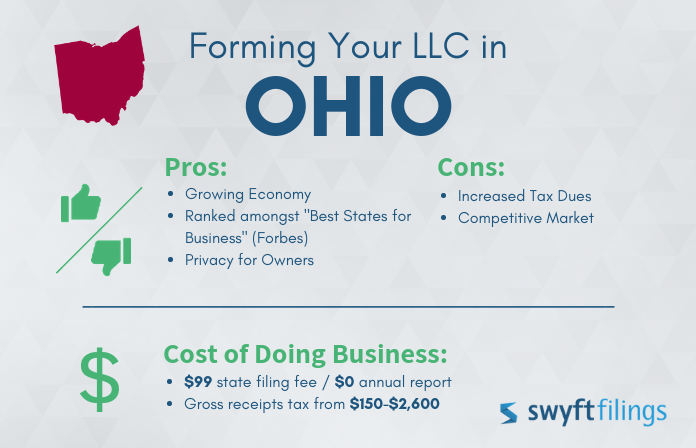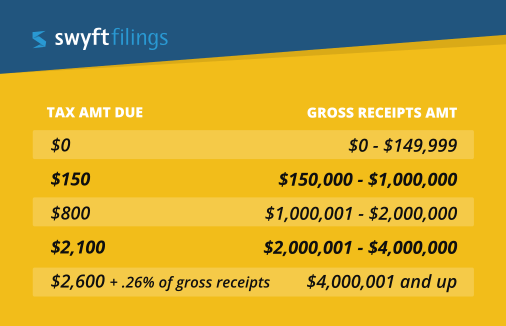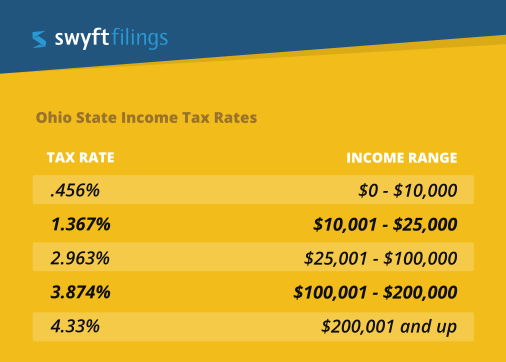State Guides
Guide to Forming an LLC in Ohio

Follow our free guide to form an LLC in Ohio:
- Pros and Cons of Forming an LLC in Ohio
- Starting Your Ohio LLC
- Maintaining Your Ohio LLC
- Additional Ohio Resources
Starting an LLC in Ohio is a process with multiple steps. Our comprehensive guide is divided into two main phases, detailing every part of the Ohio LLC formation journey.
Pros and Cons of Forming an LLC in Ohio

Pros
Growing Economy
More than 250,000 LLCs are based in Ohio, with an almost 25% annual growth rate of new businesses formed. Ohio is also among the top ten states in gross domestic product and ranks in the top five for best tax environment in the nation.
Ranked amongst “Best States for Business” (Forbes)
Ohio has risen in the ranks of Forbes annual list of best states for business, up over 10 spots to break into the top 20 (specifically #15). The state is home to at least 45 of the top 1,000 companies in the nation—including Kroger and Macy’s.
Privacy for Owners
The state of Ohio does not require the LLC members/manager to be listed in the Articles of Organization. An organizer (the party who prepares and files the paperwork) can be used to submit the official documents to the state in place of the actual owners.
Cons
Increased Tax Dues
Ohio business owners saw a major change in their tax dues beginning in January 2014—all businesses are required to pay their CAT (Commercial Activity Tax), which went from a flat $150 fee to a tiered scale of $150 - $2,600. Any business with gross receipts above $4,000,000 must also pay an additional rate of 0.26% ($2,600 + 0.26%).
Competitive Market
Because of the state’s laissez-faire approach to LLCs, Ohio is a popular location for small businesses to open shop, which means more competition for the nearly 12 million residents. Where business owners will see the most competition is in the manufacturing and financial/professional industries.
Cost of doing business
- $99 filing fee / $0 annual report
- Gross receipts tax from $150-$2,600
Phase One: Starting an LLC in Ohio
Starting a new Ohio LLC has its list of “To Do’s” in order to be official, but the process is not as complicated as you might think—you just need the right guidance for smooth LLC formation.
- Step 1: Name your LLC
- Step 2: Establish ownership of your LLC
- Step 3: Find a Statutory Agent
- Step 4: File the Articles of Organization
- Step 5: Create an LLC Operating Agreement
- Step 6: Obtain an EIN
Step 1: Name Your Ohio LLC
The first step in forming your Ohio LLC is to choose a business name; however, both the state and federal governments have guidelines concerning the use of certain words.
Tip: Use a free business name search tool to ensure your company’s desired name is available.
Business Name Guidelines
- The official name of your business must end with: Limited Liability Company, Limited Company, LLC, or L.L.C.
- Your business name cannot be intentionally misleading to consumers
- The name of your new LLC must not be similar to another organization’s name/trademark
Restrictions
- “Lottery” and “Bank” are ineligible for use (any state)
- Terms that represent educational or Veterans’ organizations are restricted
- Terms related to the Armed Forces or civil servants (police, EMT, fire)
LLC business names associated with government and/or financial entities are not always restricted - it depends on the state. Additional paperwork may be required.
URL Availability
In addition to choosing a name for your LLC, creating an online presence is equally important in the current culture. You can easily check domain name availability at a number of online web services sites.
Step 2: Establish Ownership
The owners of an LLC are known as either members and/or managers. The difference in the title depends on the management structure of the business.
Please Note: All LLCs have members; some LLCs will also have managers.
LLC Management Structures:
- Member-managed: All members participate in operating and making decisions for the LLC
- Manager-managed: An appointed manager oversees the daily operations of the LLC and the members are not actively involved.
Ohio LLC Member Guidelines:
Required Number of Members
There must be at least one member or manager to form an LLC in Ohio.
xMember Disclosure Requirements
An organizer/authorized representative may sign and file the Articles of Organization in place of the LLC members.
Age Restrictions
LLC members in Ohio may be of any age.
Residence Restrictions
There are no residency restrictions imposed on LLC members in Ohio.
Step 3: Find a Statutory Agent in Ohio
All Ohio LLCs must appoint a statutory agent. Your business cannot be official without this position.
What is a statutory agent?
A statutory agent is a person or business who is authorized to accept all official mail for the LLC.
Why do you need a statutory agent?
Ohio law requires all businesses to appoint a statutory agent so that the state government has a consistent contact person for that LLC or corporation.
What are the main requirements for a statutory agent?
- The statutory agent must have a physical address — not a P.O. Box
- The statutory agent must be available during business hours
Who can be a statutory agent in Ohio?
- A state resident with a physical address in Ohio
- An LLC or corporation that is licensed to conduct business in Ohio
Can I be my own statutory agent for my business?
You are legally allowed to be your own statutory agent as long as you have a physical address in Ohio.
Is being my own statutory agent discouraged?
LLC business owners who choose to be their own statutory agent risk compromising their personal information since the agent’s name and contact information is publicly listed.
Tip: Avoid the hassles and choose Swyft Filings to fill the statutory agent needs for small businesses in Ohio. Find more information here.
Step 4: File the Articles of Organization
One of the most important steps involved in officially forming an LLC in Ohio is filing the Articles of Organization with the Secretary of State.
What is the Articles of Organization?
The Articles of Organization is a legally binding document that is filed with the state government to officially and legally form your LLC.
Why do I need the Articles of Organization?
Your LLC business in Ohio will not be legally recognized by the Secretary of State without filing this document. Consider the Articles of Organization as part of your LLC’s foundation.
What information is included in the Articles of Organization?
- The name and address of the LLC
- The name of the members or organizer filing the paperwork
- The name and location of the statutory agent
- The statement of purpose
- The duration of the LLC (perpetual or not)
Additional Ohio Filing Requirements - Professional Service Businesses
The state of Ohio allows professional service businesses to form LLCs.
The types of professions that may form an LLC:
- Accountants
- Attorneys
- Physicians and Medical Professionals
- Professional Counselors and Psychologists
- Architects and Engineers
- Veterinarians
- Social Workers
A few points to consider:
- All members of the LLC must be licensed in the profession of the business.
- The LLC must only provide services for which the business was formed.
- The members are still subject to whichever licensing boards govern the LLC’s profession.
Step 5: Create an LLC Operating Agreement
An LLC Operating Agreement may be not required by the state government, but it is still necessary for the successful formation of your Ohio LLC.
What is an LLC Operating Agreement?
The LLC Operating Agreement is a legal document that is used by the business to define the rights and responsibilities of each person in the LLC and lays out the details involving how the business will operate.
Why do I need an LLC Operating Agreement?
The LLC Operating Agreement defines the roles of the members and identifies operational procedures; doing so creates stability and structure to the LLC and reduces future disputes.
Do I need to file the LLC Operating Agreement?
You do not need to file the Operating Agreement with the state; it is for the benefit of your LLC and remains in-house.
What goes into an LLC Operating Agreement?
The majority of LLC Operating Agreements include the following information:
- List of the members/managers and their roles
- Designation of authority in the LLC
- Initial capital contributions of the members
- Voting designations and percentages of the members
- Member transfer/addition rules and restrictions
- Distribution of profits
- Meeting schedule
Tip: Get a customized LLC Operating Agreement for your small business with Swyft Filings. Add structure to your LLC now.
Step 6: Obtain an EIN
The majority of newly formed businesses in Ohio must register for an EIN. Your Ohio LLC cannot do business without this identification.
What is an EIN?
The EIN stands for Employer Identification Number) and is a nine-digit number that the IRS assigns to your business. The EIN is also called a Federal Tax ID and distinguishes your business with the government much like a personal Social Security number.
Are all businesses required to have an EIN?
Federal law dictates that certain types of business entities register for an EIN:
- Any business with employees (even if owned by one person)
- Any business with more than one member
- A partnership (LLC or C-corp)
Please Note: A sole proprietorship is not required to have an EIN, but it is still recommended.
Why does my LLC business need an EIN?
The more common reasons you would need an EIN are:
- To hire employees
- To open a bank account in the U.S.
- To file your company’s taxes
- To pay independent contractors
In short, if you make money through your business and it has employees, you must have an EIN.
Is the EIN publicly listed?
The EIN for your LLC will be part of public record.
Can I use my Social Security Number as the EIN?
If you are a sole proprietorship who wants an EIN for your business, you can elect to use your social security number; however, your EIN is part of public record.
Swyft Filings offers EIN services for small businesses in Ohio. Find more information here.
Phase Two: Maintaining Your Ohio LLC
Now that you are finished with the initial foundational phase of your Ohio LLC, the next set of steps concern operating as an official business. Ohio’s tax set-up is a little different than other states, but you will still need to register paperwork with the state. You must also begin acquiring the licenses and/or permits that your business requires.
- Step 1: Register for Ohio State Taxes
- Step 2: Obtain Business Licenses and Permits
- Step 3: Request a Certificate of Good Standing
Step 1: Register for Ohio State Taxes
All businesses (both LLCs and corporations) formed in Ohio are responsible for paying the state’s Commercial Activity Tax (CAT), which is gross receipts tax with a tiered scale of fees. See chart below:

LLC members are also required to pay state and federal income taxes on their portion of the business’s net income. The state income tax rate in Ohio ranges from .36% to 8.98% (see below).

Other taxes your LLC may need to pay:
- Sales Tax at 5.75%
- Employee Withholding Tax
- Unemployment Tax
Step 2: Obtain Business Licenses and Permits
The licenses and permits required for an LLC in Ohio can vary, depending on a number of variables:
- Location (city and county)
- Type of Business
- Industry
Tip: If you would like to see more in-depth information on licenses and permits, please feel free to visit the content in our learning library that covers business licenses and permits.
Step 3: Request a Certificate of Good Standing
After your Ohio LLC has been formed and is ready for business, there is still one last step—obtaining a Certificate of Good Standing for your LLC.
What is a Certificate of Good Standing?
The Certificate of Good Standing is an official notification that confirms your business is properly formed and is in compliance with all state regulations.
Who issues the Certificate of Good Standing?
The Certificate of Good Standing is generally issued by the Secretary of State.
When can I request a Certificate of Good Standing for my business?
You will be able to request a Certificate of Good Standing after your LLC is officially formed through the Secretary of State.
Why do I need a Certificate of Good Standing?
Many businesses and financial institutions demand proof that your LLC is in good standing with the state government. Some companies may not even agree to engage in business if your LLC does not have this certification.
Additionally, some states require a Certificate of Good Standing before a business can apply for Foreign Qualification.
Does the Certificate of Good Standing have an expiration date?
The Certificate of Good Standing does not expire/does not need to be renewed.
Swyft Filings can create a Certificate of Good Standing for your Ohio LLC. Click here for more information.
